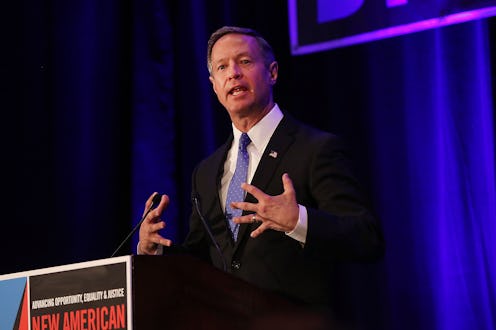Saturday night was the third Democratic debate of the 2016 election season, and each of the three candidates on stage in New Hampshire had a lot at stake going in. All three of the candidates spoke passionately on a number of issues, including gun control, terrorism, health care, and the economy. But in the end, former Maryland Gov. Martin O'Malley ultimately lost the debate, simply because this debate likely will not give him the name recognition he has so desperately been searching for. It is worth nothing, though, that each candidate had something important to prove at the debate, hosted by ABC News.
Democratic front-runner Hillary Clinton has been polling slightly behind Vermont Sen. Bernie Sanders in New Hampshire, so she needed to prove that she could outperform him even among the most liberal Democrats. Sanders, for his part, needed to prove that he could knowledgeably discuss foreign policy and national security, and that the voter database conflict with the Democratic National Committee would not hinder his campaign. As for O'Malley, this was one of his last chances to set himself apart from his fellow candidates.
In some ways, O'Malley did achieve this goal. On the subject of gun control, he interrupted moderators David Muir and Martha Raddatz with a passionate defense of his gun control record, and he criticized Clinton and Sanders for "flip-flopping" on the issue of gun safety regulations. O'Malley also defended Americans' personal freedoms, such as privacy and freedom of worship, in the ongoing discussion of national security. On top of that, he criticized Clinton's "cozy" relationship with Wall Street multiple times, and argued that she could not support, as he does, the breaking up of big banks. O'Malley certainly did have his memorable, powerful moments throughout the night. Unfortunately, that just is not enough to help him start ascending in the polls and becoming a real competitor for the Democratic nomination.
For many viewers, O'Malley's tirade about gun control — while undeniably important — was little more than an interruption. He broke the debate rules and constantly tried to speak out of turn. Similar to Ben Carson at this week's GOP debate, he made it clear that he was upset by the lack of airtime he was initially receiving. And when Sanders apologized to Clinton about a voter database breach, O'Malley jumped in to criticize the bickering in American politics, even though Sanders and Clinton arguably had quite a civil exchange on the matter and agreed to move on from it. There was obvious desperation in many of O'Malley's arguments. He has been struggling to remain relevant in the Democratic race, and Saturday night was no exception.
Leading up to the debate, a national ABC News/Washington Post poll surveying Democrats and Democrat-leaning independents put Clinton at 59 percent, compared to Sanders at 28 percent and O'Malley at 3 percent. In the days preceding the debate, Sanders' campaign sued the DNC after having its access to its voter database, which is managed by the party committee, temporarily revoked. The lawsuit came after a breach that reportedly allowed Sanders' campaign to access Clinton's voter data. This is not the first time Democratic candidates have gone head to head with the DNC. Earlier this year, both Sanders and O'Malley criticized the debate schedule put together by the DNC, with O'Malley blaming the organization for favoring Clinton. The third debate, therefore, came at an extremely contentious time.
Unfortunately, the former Maryland governor was not able to make the most of the situation. He gave a pretty solid performance, as did Clinton and Sanders, and he certainly didn't lose the debate in a dramatic way. But of the three candidates, he was the furthest away from proving what he needed to. Although Clinton and Sanders frequently went head-to-head on regime changes and foreign policy, both of them held their own in the discussion, and it seemed as though O'Malley was jumping in just so he could get as much of his platform out there as possible. In the end, O'Malley lost not because he did poorly, but because he would have needed both a game-changing performance and to organically (as in, not just through ceaseless criticism) distinguish himself from both Sanders and Clinton, and it simply did not work out that way.
